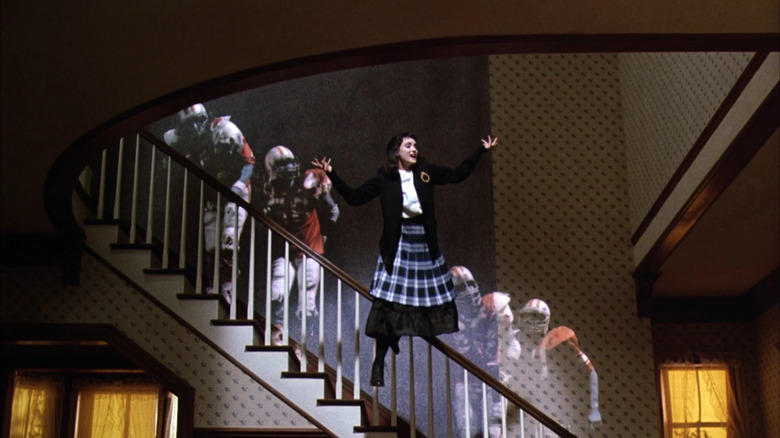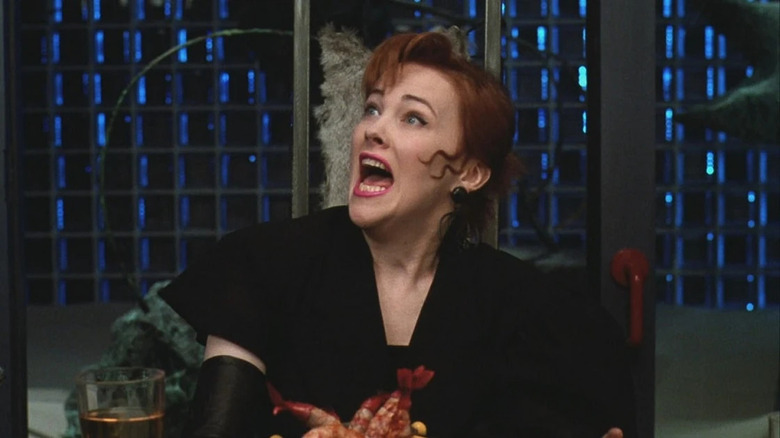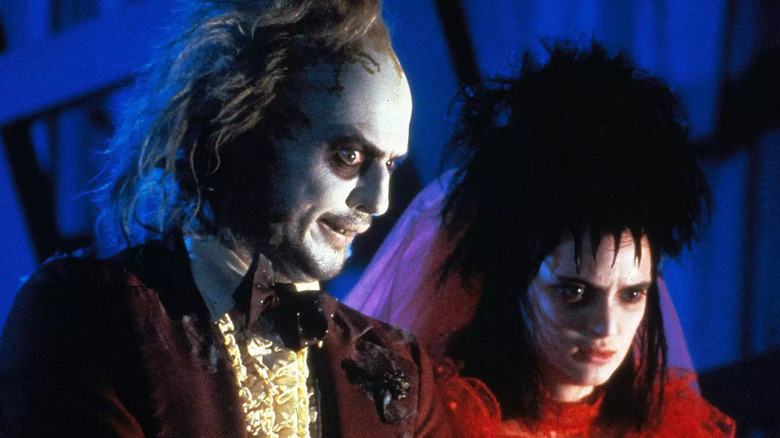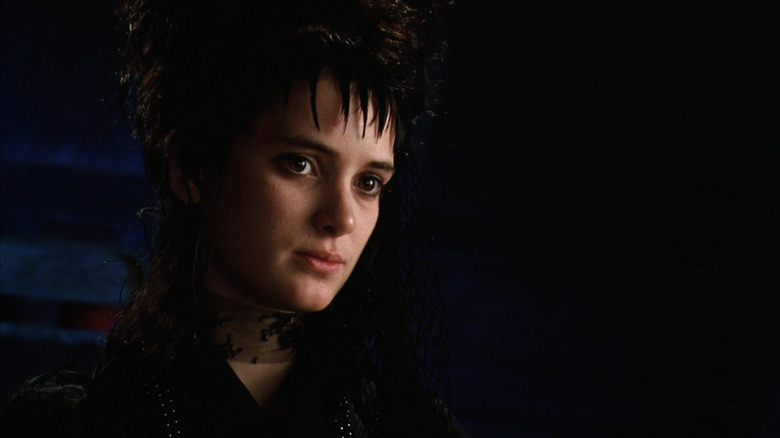
35 years since its release on March 30, 1988, what continues to stand out the most about Tim Burton's macabre and quirky film is its soundtrack — both the score by Danny Elfman and the inclusion of Harry Belafonte musical numbers. The eccentric mix of these sounds creates the ideal stage for Betelgeuse himself: the ghost with the most that teams up with the recently deceased Adam and Barbara Maitland (Alec Baldwin and Geena Davis) to haunt the pretentious, urbane Deetz family that moves into their New England-style home.
"Beetlejuice" was Tim Burton's first major feature after his breakthrough Pee-wee's Big Adventure. For the zany family film, Burton also collaborated with composer Danny Elfman, establishing a long-term creative partnership. But the "Beetlejuice" soundtrack that we all know and love almost never was.
The original screenplay by novelist Michael McDowell was decidedly grimmer, featuring a much darker alternate ending where Lydia sets herself on fire to be with Barbara and Adam. Pitchfork notes there was another draft, likely written by Warren Skaaren, that included an entirely different soundtrack.
During the infamous dinner scene, "If I Didn't Care" by the Ink Spots was supposed to play. Bill Kenny's melancholy tenor combined with the slow piano and bass sounds gives the song a drowsy feeling that is the complete opposite of the raucous "Day-O (The Banana Boat Song)" that ended up in the finished "Beetlejuice." For the "Beetlejuice" finale, Skaaren suggested that Lydia lip-sync to the soul ballad "When a Man Loves a Woman." While this may have been humorous, it would not leave audiences off on as much of a playful note as "Jump in the Line (Shake, Señora)" does.
To celebrate the film's anniversary, let's take a deeper look at why the final soundtrack makes "Beetlejuice" such an unforgettable work of gothic whimsy.
Day-O (The Banana Boat Song)

The most well-known scene is when Adam and Barbara decide to scare away their home invaders by possessing them and then forcing them to sing and shimmy along to "Day-O (The Banana Boat Song)," a traditional Jamaican folk song that became a hit in 1956 when Harry Belafonte covered it for his "Calypso" album.
The swaying sounds combined with the rich, warm tones of Belafonte's voice intoxicate the Deetz family and their dinner party guests. It's hilarious to see the uptight, anxiety-ridden character like Delia (Catherine O'Hara) sashaying to the breezy song. The countdown in the lyrics adds another layer of humor to the dinner party's punctuated choreography that culminates with them shaking their butts in the air. Their incredulous expressions while their bodies move on their own to the rhythms of Belafonte's song are absolutely priceless.
If "Day-O" wasn't originally in the script, how did director Tim Burton end up using this seemingly random song? Pitchfork reports that according to star Jeffrey Jones, Catherine O'Hara suggested the musical genre "calypso would bring more energy to the scene." However, the director was afraid that audiences would not enjoy the sequence. "He didn't think it was very funny," the music editor Bob Badami recalled.
However, the upbeat calypso number is so weird and wild that it couldn't help but work. Having the Deetz family and their city friends perform the fun, danceable "Day-O" makes complete sense for Adam and Barbara's more wholesome and silly brand of haunting.
Jump In The Line (Shake, Señora)

The ending song "Jump in the Line (Shake, Señora)" by Harry Belafonte always makes me want to get up and dance. It has a jovial energy that concludes "Beetlejuice" in the most uplifting way. We can already see the positive changes in the final scene, where the lighting is brighter and the Maitland's beautiful Victorian home is back to normal — stripped of Delia's cold, inhospitable redecorations. The Maitlands have learned to peacefully coexist as ghosts with the living Deetz family. Adam and Barbara take Lydia on like their own daughter, encouraging her to do well in school.
Her reward for getting an A on a math test? Singing and dancing along to Harry Belafonte's lively "Jump in the Line (Shake, Señora)" with a ghostly football team. Even the furniture joins in. The sight of the goth and typically dreary teen smiling and being lifted into the air is delightful. It's the supernatural and human world living in perfect harmony and celebrating with cheerful music.
"Jump in the Line" and "Day-O" are surprising additions to "Beetlejuice," yet their vivacious calypso style seems to perfectly capture the film's surreal and comical nature. The original story writer Larry Wilson remarked to Pitchfork on these unusual soundtrack choices: "Why? Why not? That's the secret of 'Beetlejuice.' No one was afraid to take things to the most far-out places."
Danny Elfman's Score

If the Harry Belafonte songs are offbeat and unexpected, Danny Elfman's "Beetlejuice" score has exactly the kind of bizarre and humorous tone that matches the manic title character and his various hijinks. "Main Titles" immediately immerses you in the film's strange world and its ghostly antagonist. Elfman mixes blaring tubas, eerie vocals, swirling clarinets, and frantic strings in a bouncy melody that sounds like a deranged circus. The combination of these frenzied, chaotic sounds seems to convey how unpredictable and provocative Betelgeuse is.
Elfman's score captures a range of different moods. The use of church organs and choirs add a twisted religiousness and sense of mourning to the afterlife scenes. On the opposite end of the spectrum, Elfman uses dreamy harps and strings to express the Maitland's romantic connection, suburban comfort, and yearning to return to the mortal world. 35 years later, Danny Elfman has made one of the most diverse and imaginative scores in film history. Pulling from calypso, traditional horror, and carnival music, Elfman concocts a eclectic musical blend of spookiness and over-the-top humor that cements "Beetlejuice" as one of the most truly unique films of all time. And if you just can't get enough, "Beetlejuice 2" is currently in development at Brad Pitt's Plan B production company, with Jenna Ortega in talks to star.
Read this next: Horror Movies That Make Us Root For The Villain
The post 35 Years Later, Beetlejuice's Soundtrack is the Key Reason the Movie Works appeared first on /Film.
